I’m thinking of a film about two men in love with each other, but one of them loving a bit less. Their lusts and longings are entirely about women and children are sired, but nothing approaches their feelings for each other. They’re constantly pried apart by social-political concerns and they never quite mesh, but the man who loves a bit more can never quit his feelings. He doesn’t know how, and he hurts badly as a result.
And then one of them is killed by a group of violent men who despise what their victim stands for, and finally the longish movie (lasting over two hours) ends with the survivor lamenting his dear friend’s passing and talking quietly to his ghost.
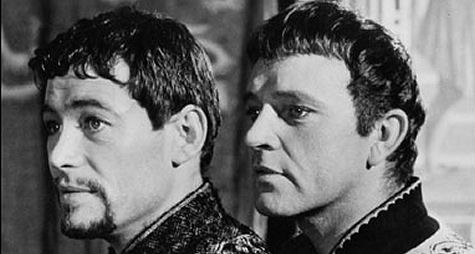
Peter O’Toole, Richard Burton in publicity still for Peter Glenville’s Becket
The men with unquenchable feelings for each other are played by movie stars in their prime, the movie is funded by a major studio, and come January it is honored with a slew of high-prestige Oscar nominations — Best Picture, Best Actor, Best Supporting Actor, Best Director, Best Adapted Screenplay, and so on. Everybody admires or at least respects it, and the reviews are almost 100% ecstatic.
The movie, of course, is Peter Glenville’s Becket, which came out just shy of 42 years ago. But the element of men in love with each other (in a not-quite-sexual way) was no less pronounced or emotionally intense than the love affair in Brokeback Mountain, except for Becket‘s lack of depicted physical intimacy.
And yet it’s a film in which the lead actors share a bed in the first act, with one of them confiding to the other a few pages earlier that “I can’t bear to think of you in pain.” They argue fiercely during a third-act scene about rejected feelings of love between them, and a disapproving female accuses one of having “an obsession” for the other that is “unhealthy and unnatural.”
In fact, it’s more than a little bit astounding that a movie as “gay” as Becket was released five years before the Stonewall riot and the beginning of the gay rights movement, and that it was made by the stodgy-at-the-time Paramount Pictures, and was performed by two of the era’s most respected actors (Peter O’Toole and Richard Burton), and was patronized by straightlaced audiences who had probably never considered the idea of emotional dignity between homosexual men.
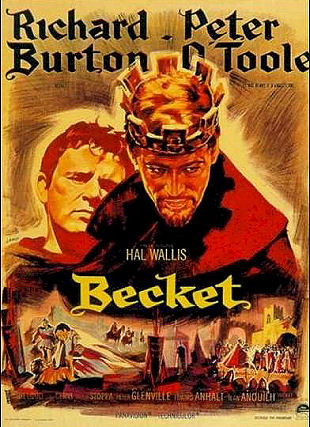
In short, there are a lot of striking similarities between Becket and Brokeback Mountain. So many, in fact, that the stage has been pretty much set by James Schamus and Ang Lee’s western for Becket to enjoy a whole new level of interest on DVD.
But years after plans were first made by MPI Home Video to bring out a loaded Becket disc, complete with a making-of documentary and a commentary track by Peter O’Toole, the chances of it coming out any time soon seem…well, a bit up in the air.
MPI Home Video marketing executive Greg Newman says the DVD will be out “this year,” but his reluctance to speculate about whether he’s speaking of the spring, summer, fall or winter indicates that MPI’s plans are perhaps less than rock-solid. Newman’s vagueness suggests that the Becket DVD, whenever it finally peeks through, may strike when the iron is cold.
Unless, of course, it happens to be released at the same time that Brokeback Mountain comes out on DVD, which will probably be in the late spring or early summer.
I know that no video company would be forecasting an ’06 release of a major title in late January without having formulated some kind of ballpark or target release-date in their heads.
And I can’t imagine Peter O’Toole not having questions about the Becket DVD also, some two years and four months after taping his supplemental interview footage and voice-over commentary for MPI in London, in the fall of ’03.
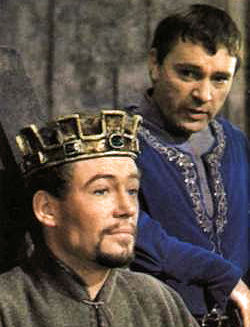
Becket has been out of circulation for several years due to a rights-and-revenue issue and the family of Jean Anouilh, the French author of the original stage play of “Becket” that Glenville’s film was based upon. Plus the 40 year-old film elements had deteriorated. But a 35mm version was restored about three years ago by the Academy Film Archive, with support from the Film Foundation.
Around the same time (i.e., the summer/fall of ’03), MPI, which has owned the video rights for a long while, began making plans for a DVD release of the film. The revenue issue with the Anouilh family has finally been resolved, I was told by an MPI spokesperson on Monday, but there’s still a measure of uncertainty about anyone seeing a DVD of Becket with a firm date in mind.
I think it’s fair to say that the Illinois-based MPI Home Video is known for being a small-time, not-quite-in-the-hip-groove-of-things outfit, and it seems a shame that a film as good and valuable as Becket should be land-locked with a company of this calibre. Becket is clearly the kind of highly-valued classic that should be released by a toney video company like Criterion or Acorn Media.
I saw Becket on a big screen in the summer of ’04 and again at a UCLA class that I moderated last spring, and it holds up very nicely. Burton is masterful as Thomas Becket, but O’Toole’s performance as King Henry II is one of the most exciting ever seen in a mainstream movie. O’Toole takes your breath away half the time, and the other half he makes you grin with delight.
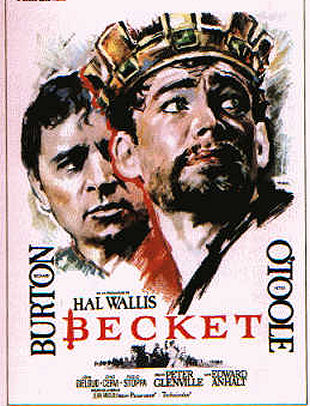
Nominated for 12 Oscars (but winning only one for Best Adapted Screenplay), Becket isn’t just a touching story about unrequited love but one that manages to dramatize in a recognizable way what it is to experience profound spiritual growth.
It’s a conventional costume drama in some respects, yes, but it’s one of the smartest and most engrossing features ever made in this vein. Directed by Glenville from a screenplay by Edward Anhalt (who adapted Jean Anouilh’s play), photographed by the great Geoffrey Unsworth and edited by Anne V. Coates, Becket feels slightly hemmed in by the conventions of prestige-level filmmaking as they existed in the mid ’60s, but the delivery and the talent levels are tip-top.
MPI has owned the film for several years but contributed nothing to the Academy’s restoration costs (about $125,000, give or take), which were covered by the Film Foundation. The restoration work was handled by Mike Pogorzelski, who provided the print of Becket that was shown at UCLA last March.
Newman told me almost two years ago that MPI got O’Toole to record a commentary track in London in the fall of ’03. The 71 year-old actor talked all through the 2 hour and 29 minute film, Newman said.
“We’re still doing quite a lot of the technical work for the DVD and everything else,” Newman told me in the summer of ’04, “and we’re going to have a hell of an extras package, and these releases take time. I hope that it will come out next year.”

Newman was referring to a 2005 release, which never happened.
“Remember, we’re coming right on the heels of this restoration thing,” Newman said. “It was only finished recently.” When he said this, the restored Becket had been screened in London seven months earlier.
The crux of the restoration was about the original stereo mix of Becket being digitally reconstituted. “That’s what the restoration was mainly about,” I was told in the summer of ’04.
“MPI never invested in the film,” says restoration specialist Robert Harris, who wanted to restore Becket a decade ago. “If the Academy hadn’t done it, those audio tracks would have been trashed. The Academy is an angel here.”
Harris told me that MPI “should pay the Academy back out of their first earnings, because without the Academy’s efforts they wouldn’t have a film to release.”
Nommie Nommie
A hearty yee-haw for the eight nominations that went to Brokeback Mountain this morning. This pretty much certifies that Ang Lee’s film has the Best Picture Oscar in the bag. Someone tell me how this won’t happen.
And a big college yell for Best Picture nominees Capote (as well as Best Actor contender Philip Seymour Hoffman, Best Director hopeful Bennett Miller and Best Adapted Screenplay nominee Dan Futterman), Paul Haggis and Bobby Moresco’s Crash, and George Clooney’s Good Night, and Good Luck.
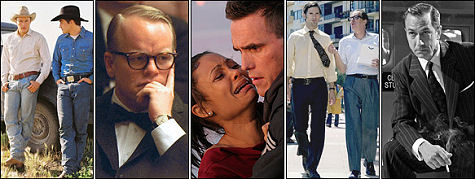
The Best Picture nominees: Brokeback Mountain,
And a confused head-shake over Munich taking the fifth Best Picture nomination.
I understand the reasoning, I think. Why shouldn’t a movie that appalled a significant portion of film cognoscenti the world over with that ludicrous cross-cutting between Eric Bana schtupping his on-screen wife and a reenactment of the 1972 shoot-out between Black September kidnappers and German police at Munich’s Furstenfeldbruck air base…a film such as this is surely a finer and more worthy achievement than The Constant Gardener, Walk the Line or Match Point.
Three and a half hours ago (around 7 am) I received an e-mail that said “Steven Spielberg says fuck you,” and I guess I deserved that.
But let’s be clear: my comment to Newsday‘s Jon Anderson in late December was that Munich was “dead, dead…deader than dead” as a Best Picture winner. (And that’s still the case today, as everyone well knows.) I asked Anderson to please get this right because I knew that the Academy psychology might give up a Best Picture nomination, despite all the minuses.
Munich helmer Steven Spielberg wouldn’t have been nominated for Best Director without the ingrained Spielberg kowtow sensibility out there. No friggin’ way would Roger Donaldson have been nominated if he’d directed the same Munich now playing in theatres.
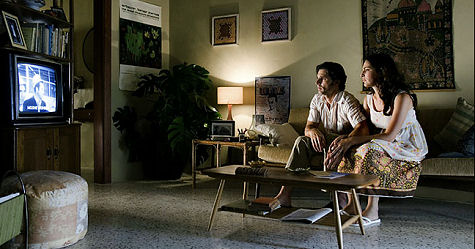
Avner (Eric Bana) and Munich-massacre-montage fuck partner watch initial tube coverage of 1972 Munich Olympic Games hostage standoff
But let’s ease up and acknowedge that NBC/Univeral publicists and, yes, Munich water-carrier David Poland managed to sell it for all it was worth…they and other Munich team members pulled it off against great odds. They helped to save Munich from total humiliation. Now go away and don’t come back until the DVD comes out.
The Oscar show ratings on March 5th will be fairly low because the viewing audience for the five Best Picture nominees isn’t that high (so far), but what could the academy have done? Nominate King Kong or Fun With Dick and Jane for Best Picture? It’s going to be a gnarly three or four weeks for ABC’s ad sales team.
A big hand to the Academy for giving George Lucas what-for by not nominating Revenge of the Sith for a special-effects award. It took them a while to stand up and grow a pair, but they finally delivered a referendum on the soullessness of the Star Wars prequels.
And another cheer for their refusal to nominate the thoroughly rancid Sin City in this category, although it should be once again acknowledged that the black-and- white photography in this otherwise pukey film was to-die-for.
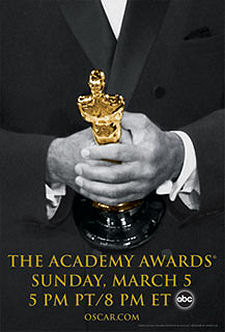
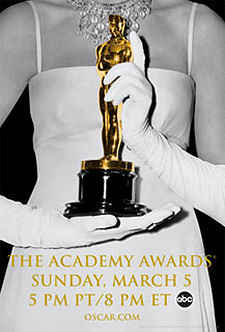
Congratulations to the great Terrence Howard for nabbing a Best Actor nomination for his superb performance in Craig Brewer’s Hustle & Flow. It wasn’t that long ago when handicappers were saying he might not have the juice to go all the way (especially after he got re-categorized by the Golden Globes). A proud moment for a good man.
Mixed congratulations, at best, to North Country‘s Frances McDormand….the truly great Frances McDormand…for her Best Supporting Actress nomination. No self- respecting actor wants accolades for playing a blue-collar laborer dying from Lou Gehrig’s disease and saying “fuck you” out of a voice box.
McDormand was nominated because some not-very-hip Academy people decided to think sappy. It’s wrong, wrong, wrong that In Her Shoes costar Shirley MacLaine and The Family Stone‘s Diane Keaton were blown off in this category.
Down the list and firing at will…
It doesn’t seem right that both Walk the Line honcho James Mangold and The Constant Gardener helmer Fernando Meirelles weren’t included among the five Best Director nominees. I understand why History of Violence helmer David Cronenberg didn’t have the votes, but he’s still a world-class artist whose films will play to film lovers 100 years from now.
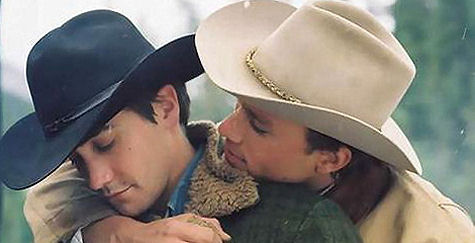
Best Supporting Actor nominee Jake Gyllenhaal, Best Actor nominee Heath Ledger
Walk the Line‘s Reese Witherspoon will win for Best Actress, but I wish her competition was stronger, and I’m lamenting again that Toni Collette didn’t get her due by receiving a Best Actress nom for In Her Shoes…a performance that was absolutely in the same league as Witherspoon’s, if not above and beyond.
Keira Knightley’s Best Actress nomination for her work in Pride & Prejudice is bizarre, I think. Weird. I saw that film again on an Academy screener earlier this month, and if she weren’t young and beautiful…aaahh, forget it.
Paul Giamatti will probably win the Best Supporting Actor Oscar for his Cinderella Man trainer, but hooray for Crash costar Matt Dillon nabbing a nomination in this category. Couldn’t have happened to a nicer, harder-working guy…and for playing a cop with pretty ugly stuff inside.
And cheers to the great William Hurt for winning a nomination for his hilarious, jaw-dropping History of Violence performance.
Cheers to Junebug‘s Amy Adams for taking a Best Supporting Actress nom, even though The Constant Gardener‘s Rachel Weisz is the almost-certain winner.
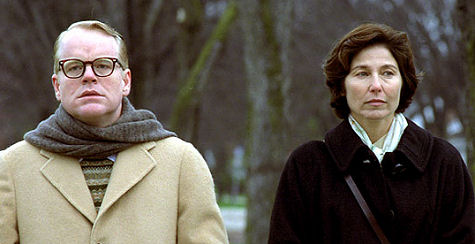
Best Actor nominee Philip Seymour Hoffman, Best Supporting Actress nominee Catherine Keener
Congrats to Match Point director-writer Woody Allen for his Best Original Screen- play nomination. I thought this might not happen after the Writers Guild blew him off.
The Best Foreign Language Film showdown is between Hany Abu-Assad’s Paradise Now and Gavin Hood’s Tsotsi, but I’m half- presuming that concerns about the recent election of Hamas to run the Palestinian state will adversely affect support for Abu-Assad’s film. Everything cross-pollinates.
March Of The Penguins has long been the presumed favorite in the Best Documentary Feature race, but maybe the start of the Enron trial in Houston will assist its closest competitor, Enron: The Smartest Guys In The Room.
And shame once again upon Freida Mock and her documentary nomination committee for failing to even short-list Werner Herzog’s Grizzly Man, by far the most critically honored and awarded doc of the year.
Nothing else has me revved right now. I’ll put more stuff in as the day progresses, and I’ll put the final nominations into a final Oscar box later this morning.
Oh, and Hollywood Elsewhere didn’t arise at 5 ayem this morning to tap this piece out because waking at 6 ayem was rigorous enough.
Expanded Balloon
Oscar Balloon ’06 is finally up and running, and the more input and attention the better. Movies that look like they might rate because they’re been (or are being) directed and written by proven top-tier talents…that’s all this is now.
Best Picture: Flags of Our Fathers (DreamWorks); The Departed (Warner Brothers); Babel (Paramount); The Good Shepherd (Universal Pictures); The Good German (Steven Soderbergh); Che (Focus Features); Southland Tales (Universal); Marie Antoinette (Columbia Pictures); The Pursuit of Happyness (Columbia Pictures); Breaking and Entering (The Weinstein Co.); Infamous (Warner Independent); All The King’s Men (Columbia Pictures); A Good Year (20th Century Fox); Stranger Than Fiction (Columbia); I’m Not There: Suppositions on a Film Concerning Dylan (Cinetic Media); Dreamgirls (DreamWorks/Paramount); Running With Scissors (Columbia); World Trade Center (Universal); The Prestige (Touchstone); The Children of Men (Universal); Zodiac (Paramount).
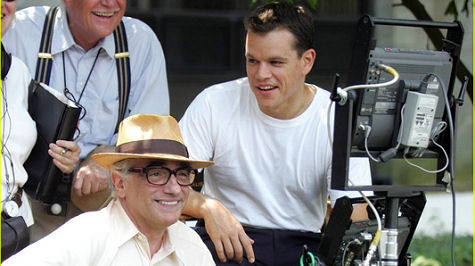
Matt Damon, Martin Scorsese during filming of The Departed
Best Director: Clint Eastwood (Flags of Our Fathers); Anthony Minghella (Breaking and Entering); Martin Scorsese (The Departed); Steven Soderbergh (The Good German, Che); Ridley Scott (A Good Year); Alejandro Gonzalez Inarritu (Babel); Marc Forster (Stranger Than Fiction); Richard Kelly (Southland Tales); Steve Zaillan (All The King’s Men); Bill Condon (Dreamgirls); Doug McGrath (Infamous); Ryan Murphy (Running With Scissors); Oliver Stone (World Trade Center); Chris Nolan (The Prestige); Alfono Cuaron (The Children of Men).; Todd Haynes (I’m Not There: Suppositions on a Film Concerning Dylan); David Fincher (Zodiac).
Best Actor: Will Smith (The Pursuit of Happyness); Matt Damon (The Good Shepherd); Jude Law (Breaking and Entering); Sean Penn (All The King’s Men); Brad Pitt (Babel).
Best Actress: Anette Bening (Running with Scissors); Nicole Kidman (Fur); Cate Blanchett (The Good German or Babel); Maggie Gyllenhaal (Stranger Than Fiction).
Best Supporting Actor: Jack Nicholson (The Departed); Hugh Grant (American Dreamz); Gael Garcia Bernal (Babel); Albert Finney (A Good Year ); Jamie Foxx (Dreamgirls), Javier Bardem (Che).
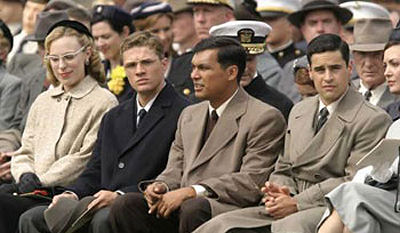
Ryan Phillipe (l.) and costars in Clint Eastwood’s Flags of Our Fathers
Best Supporting Actress: Kate Winslet (All The King’s Men), Sandra Bullock (Infamous)
Best Original Screenplay: Richard Kelly (Southland Tales); Paul Weitz (American Dreamz); Eric Roth (The Good Shepherd); Anthony Minghella (Breaking and Entering).
Best Adapted Screenplay: Sofia Coppola (Marie Antoinette).
Best Feature Documentary: God Grew Tired of Us ((Christopher Dillon Quinn, Tom Walker); Sicko (Michael Moore).
Sure To Be Remembered: Snakes on a Plane (New Line Cinema — director: David Ellis — CAST: Samuel L. Jackson, Nathan Phillips, Benjamin McKenzie).
Grabs

In motion on the Santa Monica Pier merry-go-round — Sunday, 1.29.06, 4:10 pm.
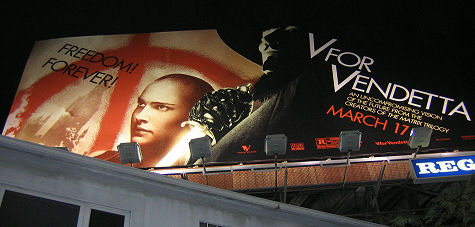
Billboard over Book Soup on Sunset Strip — Saturday, 1.28.06, 9:55 pm.

Posted at pizza joint on Abbot Kinney Blvd. in Venice — Sunday, 1.29.06, 5:15 pm.
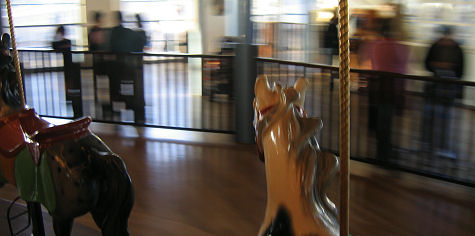
Sunday, 1.29.06, 4:12 pm.
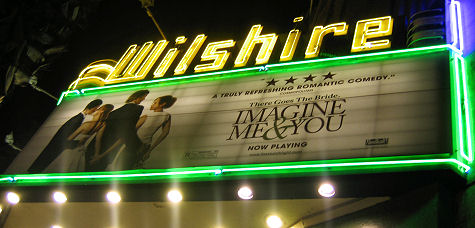
Sunday, 1.29.06, 6:45 pm.
Quince…what?
Day after day and hour after hour during the Sundance Film Festival I asked every journalist, distributor and agent I ran into what they’d seen and liked (or half-liked). I must have asked this question 60 or 70 times over the eight days I was up there…
And nobody mentioned Quinceanera, a small-scale drama about sexual tensions vs. Hispanic community values in L.A.’s Echo Park. It was like it didn’t exist…one of those strugglers that sometimes get lost in the shuffle.

I can guess but I don’t precisely know who these guys are, but they’re Quinceanera costars. Possibly Jesse Garcia and Emily Rios.
And yet Wash Westmoreland and Richard Glatzer’s film not only won the Dramatic Grand Jury Prize last night but the Dramatic Audience Award, which hasn’t occured at a Sundance Film Festival since Tony Bui’s Three Seasons took the same two prizes in 1999.
I guess I should spend more time talking to non-pro types and not just my know- it-all friends. It’s probably also fair to say that the other dramatic competition entries — Stay, Sherrybaby, Somebodies, Wristcutters, Stephanie Daley, The Hawk is Dying, Right at Your Door, etc. — all had some kind of drawback or dislike element. (I had no beef with Daley at all — it’s a very respectable and well-made trauma drama.)
That rumor about Bob Berney’s Picturehouse having bought Quinceanera for distribution isn’t true, by the way. Berney told me this morning it’s “a good rumor” but an inaccurate one. He agreed that the buzz about Quinceanera wasn’t very strong during the festival, but said it was apparently a “local” favorite (i.e., among people in the ticket lines).
Since almost no one in journo circles saw it, I suggested an idea this morning to Quinceanera producer Anne Clements, whom I reached via cell phone: offer it for a showing at the Santa Barbara Film Festival (which kicks off on Thursday, 2.2). Festival director Roger Durling told me he might be able to find a loose slot in his schedule if the film were to be made available.

Wash Westmoreland, Richard Glatzer, who co-directed and co-wrote Qinceanera, during the ’06 Sundance Film Festival. (Pic stolen from Indiewire site.)
There was another double winner last night when Christopher Quinn’s God Grew Tired of Us won both the Grand Jury Documentary Prize as well as the Audience Doc Award — another festival first.
The World Cinema Jury Prize for Best Documentary went to Juan Carlos Rulfo’s In The Pit, which Variety‘s Robert Koehler went on about and told me to see. It explores the day-to-day lives of guys building an upper deck to Mexico City’s Periferico freeway.
The World Cinema Dramatic Jury Prize went to Gela Babluani’s 13 Tzameti. The World Cinema Audience Documentary Award was given to Tim Dirdamal’s De Nadie, about a female Central American immigrant making her way from souterhn Mexico into the U.S. And the World Cinema Audience Dramatic Award was given to Toa Fraser’s No. 2.
Here’s the official announcement.
